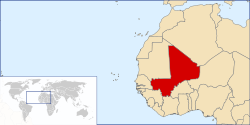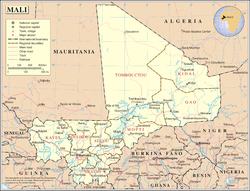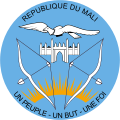

The following outline is provided as an overview of and topical guide to Mali:
Contents
- General reference
- Geography of Mali
- Location
- Environment of Mali
- Regions of Mali
- Demography of Mali
- Government and politics of Mali
- Branches of the government of Mali
- Foreign relations of Mali
- Law and order in Mali
- Military of Mali
- Local government in Mali
- History of Mali
- Culture of Mali
- Art in Mali
- Sports in Mali
- Economy and infrastructure of Mali
- Education in Mali
- Health in Mali
- See also
- References
- External links
Mali – landlocked sovereign country located in West Africa. [1] It is the seventh most extensive country in Africa, bordering Algeria on the north, Niger on the east, Burkina Faso and the Côte d'Ivoire on the south, Guinea on the south-west, and Senegal and Mauritania on the west.
Consisting of eight regions, Mali's borders on the north reach deep into the middle of the Sahara, while the country's southern region, where the majority of inhabitants live, features the Niger River and Senegal River. The country's economic structure centers around agriculture and fishing. Some of Mali's natural resources include gold, uranium, and salt. Due to a high incidence of poverty, Mali is considered to be one of the poorest nations in the world.
Present-day Mali was once part of three West African empires that controlled trans-Saharan trade: the Ghana Empire, the Mali Empire (from which Mali is named), and the Songhai Empire. In the late 19th century, Mali fell under French control, becoming part of French Sudan. Mali gained independence in 1959 with Senegal, as the Mali Federation in 1959. A year later, the Mali Federation became the independent nation of Mali in 1960. After a long period of one-party rule, a 1991 coup led to the writing of a new constitution and the establishment of Mali as a democratic, multi-party state.





